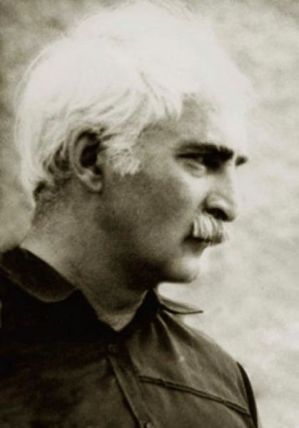Georgian dissident, musician, poet. One of the leaders of the movement for Georgia's secession from the USSR.
Born into the family of Olga Demuria and Ivane Kostava. His grandfather, Vladimer Demuria, was a well-known public figure and teacher. Merab was greatly influenced by his uncle, the famous actor Grigol Kostava, who was repressed, and by the classic of Georgian literature, Konstantine Gamsakhurdia.
From 1946, Merab studied at the First Tbilisi School, where he befriended Zviad Gamsakhurdia. In 1954, they founded the underground youth organization “Gorgasliani.” From 1956 to 1958, they were imprisoned on charges of conducting “anti-Soviet activities” and distributing anti-communist literature and leaflets.
In 1962, Kostava graduated from the Tbilisi Conservatory. From 1962 to 1977, he taught at a music school in Tbilisi. He wrote poetry, as well as literary, philosophical, and theatrical essays, and did translations. He worked for the journal “Balaveri” (Georgian language and literature in school).
In 1973, Kostava and Gamsakhurdia created the Initiative Group for the Defense of Human Rights. In 1976, they founded the Georgian Helsinki Group (renamed the Georgian Helsinki Union in 1989), and from 1987 to 1989, Kostava was a member of its Council.
From 1975, Kostava was a member of Amnesty International.
In 1977, he was imprisoned and served his sentence in the strict-regime camp VS-389/37 in the Urals. Together with Ukrainian political prisoners, including V. DOLISHNIY, S. Yankevych, V. MARMUS, and A. Bernychuk, he participated in acts of defiance, and in 1979, he adopted Political Prisoner Status.
In 1978, along with Gamsakhurdia, he was nominated for the Nobel Peace Prize by the U.S. Congress.
From April 1980, he was in exile in the village of Kvitok, Tayshetsky Raion, Irkutsk Oblast, where his term of exile was extended.
He was released in 1987. He was the author of samizdat and a number of scholarly works and literary pieces, and one of the publishers of the underground newspaper “Okros Satsmisi” (The Golden Fleece). He maintained contact with A. SAKHAROV. He was a proponent of a new understanding of the Gospel and was working on his own translation of it into Georgian. He was a co-founder (1988) of the Society of St. Ilia the Righteous (Ilia Chavchavadze).
As one of the leaders of the Georgian national liberation and democratic movement, he participated in the meeting of the Inter-National Committee for the Defense of Political Prisoners in Yerevan on January 12–14, 1988, where Ukraine was represented by V. CHORNOVIL and M. HORYN. At the Lviv meeting of representatives of national-democratic movements of the peoples of the USSR on June 11–12, 1988, he represented the Society of Ilia Chavchavadze. He signed the documents of the Riga meeting (September 25), where Ukrainians V. CHORNOVIL, S. KHMARA, and O. SHEVCHENKO were also present, on behalf of the Georgian National-Democratic Party. He participated in an inter-national chain hunger strike demanding the release of political prisoners, which began on June 13, 1988, and lasted until July 1—the closing day of the 19th Party Conference.
In 1988–1989, he was the organizer of many mass protests, including the demonstration on April 9, 1989, in Tbilisi, which ended with its bloody suppression by Soviet troops.
Kostava died in a car crash under unclear circumstances. He is buried in the Pantheon of Writers and Public Figures of Georgia on Mtatsminda Mountain.
Bibliography:
Chornovil V. Tvory: U 10-y t. [Works: In 10 vols.]. – Vol. 6. Dokumenty ta materialy (Lystopad 1985 – kviten 1990) / Comp. Valentyna Chornovil. – Kyiv: Smoloskyp, 2009. – pp. 331, 423, 716, 726, 728, 731, 954, 959.
Material from Wikipedia – the free encyclopedia
So dnya smerti Meraba Kostava proshel 21 god [21 years have passed since the death of Merab Kostava]. http://www.lazare.ru/poleznye/sobytija/3753-so-dnja-smerti-meraba-kostava-proshel-21-god.html?tmpl=component&p
Vasyl Ovsiienko and Volodymyr Marmus, based on Internet materials. December 2010.

KOSTAVA MERAB